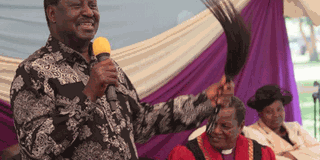Why the anti-corruption campaign remains elusive despite gallant efforts

Cord leader Raila Odinga addresses guests at his Opoda farm in Bondo on January 29, 2016. In fact, Mr Odinga has upped the ante. He recently publicly cited names of those he alleges are either involved or are persons of interest where corruption is involved. PHOTO | TOM OTIENO | NATION MEDIA GROUP
What you need to know:
- In the 1990s when good governance was identified as the missing link in Africa’s development, both national and international actors agreed that building institutions was critical to realising good governance.
- Mwai Kibaki even had an anti-corruption tsar in his office sourced directly from Transparency International.
- The fight against corruption will remain elusive because of our partisanship and the naïve reactions it leads us to.
For sometime now, the political opposition has run an anti-corruption agenda. Led by ODM leader Raila Odinga, this agenda has exposed some major corruption cases.
These include the NYS saga and Eurobond which is now firmly on the national radar.
Of course, there is the attempted obfuscation by some, especially those allegedly involved in corruption or the government agencies tasked with, but incapable of, performing their anti-corruption tasks.
However, despite their attempts, the campaign against graft has achieved a high level of popular traction.
The word is out, the reactions are popular and the impact occasionally leads to a resignation here and a retraction of previously stated positions there.
But outright success against persisting corruption remains elusive.
This is the case even when the exposure of the corrupt seems spot on and the evidence is not controverted by anyone in position of authority.
In fact, Raila Odinga has upped the ante. He recently publicly cited names of those he alleges are either involved or are persons of interest where corruption is involved.
The act of publicly naming persons is courageous for it should have attracted prompt court cases.
Yet, most of those cited have made feeble threats and retreated back into the comfort of their powerful positions. Some have simply remained silent.
Their hope is that our national culture of short memory will silence and kill the allegations.
In the 1990s when good governance was identified as the missing link in Africa’s development, both national and international actors agreed that building institutions was critical to realising good governance.
WHAT A SHAME
It was believed that institutions were better placed to sustain the fight against corruption.
Thus, nations invested huge sums in building those institutions especially the anti-corruption agencies.
Mwai Kibaki even had an anti-corruption tsar in his office sourced directly from Transparency International.
The story of institutions and of key luminaries in the fight against corruption is long and complex.
But the bottom line is that committed individuals have been more successful in exposing cases of corruption than the institutions into which large sums of money were invested.
Today, while the Ethics and Anti-Corruption Commission gallops huge sums of money, its track record in taming mega-corruption is unknown.
What is shameful is that Dr David Ndii, simply by reading publicly available government records, does a better job in identifying anomalies in the financial record than a publicly funded Commission.
It would have been expected that once the Auditor-General flags out the anomalies in the record and government officials offer no clear explanation of those anomalies, the anti-corruption agencies would seize that opportunity, pursue the case and ensure that those liable are identified, punished and made to pay back for whatever loss.
But in fact, our challenge is that those agencies charged with ensuring compliance seem eager to procrastinate, obfuscate and stall the anti-corruption fight.
They seem captive to the very forces they are meant to expose, investigate and punish.
SAFEGUARDING THE CORRUPT
Why shouldn’t we conclude that they are there to protect corruption, that they are there to make us feel like something is happening when in fact nothing is going on?
What this means is that citizen engagement with the anti-corruption fight is the only lasting solution to corruption.
But even in the context of revelations that show that money has been corruptly lost or in spite of contradictory statements by respective officials regarding funds sourced in our name or even acknowledgment by government officials that funds were lost under their watch, Kenyans remain numbed in acting against corruption.
The fight against corruption will remain elusive because of our partisanship and the naïve reactions it leads us to.
Meanwhile, expecting that the agencies meant to fight corruption will be effective is to ask for far too much. My feeling is that they are there to make sure nothing is happening.
Godwin Murunga is a Senior Research Fellow, Institute for Development Studies, University of Nairobi and Deputy Director of the African Leadership Centre, Nairobi.





